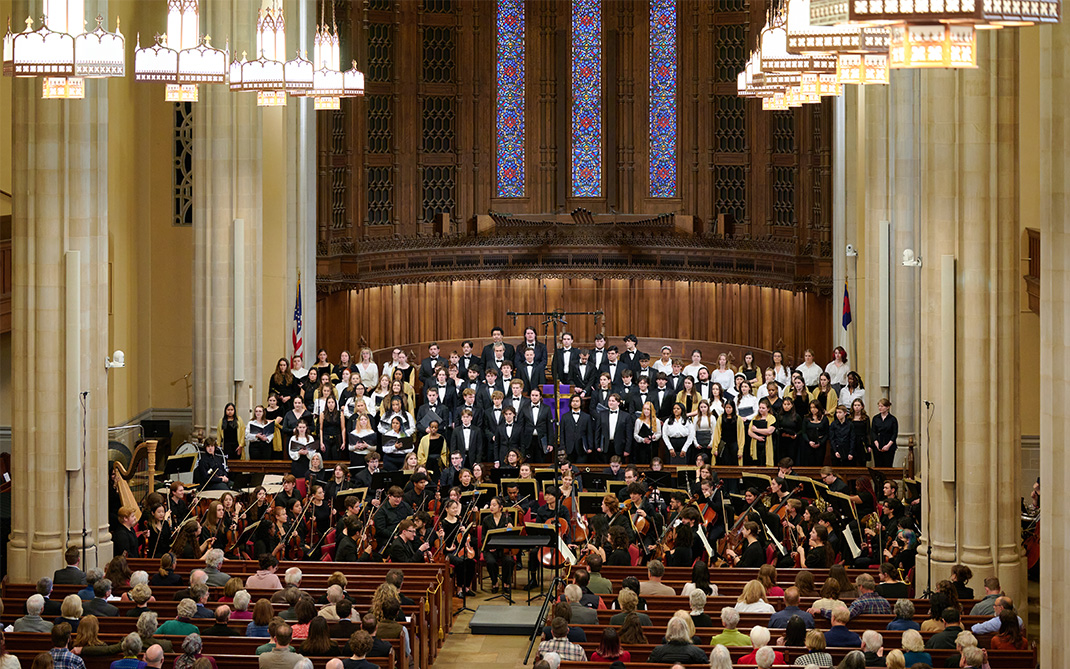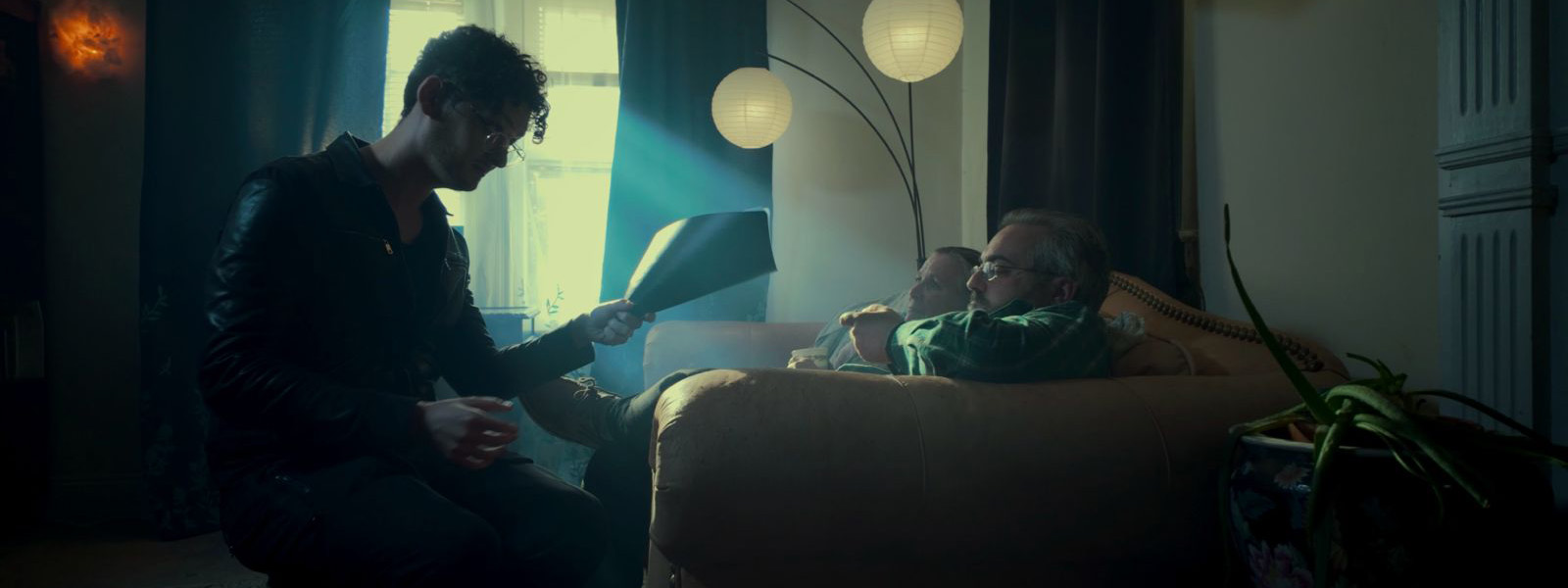Filmmaking grad Dimitri Dikhel's unconventional path to the silver screen
A native of Ukraine, 2024 School of Filmmaking graduate student Dimitri Dikhel’s move with his family to Germany at age five marked a pivotal point in his journey. The creative producing student initially viewed a career in the arts as an unattainable and unreliable option financially, so he pursued a different path — medicine. “If you want to be a doctor, you really have to love it,” he says. “And I would’ve been a horrible doctor.”
Instead, Dikhel refocused his aspirations to pursue a more creative career. Before leaping into the arts, he opted for a “safer and more practical job” in teaching. With the mindset that teaching was strictly a backup plan, he was set on maximizing what he could learn during his time at Ruhr University in Germany and studying abroad at Central Michigan University.
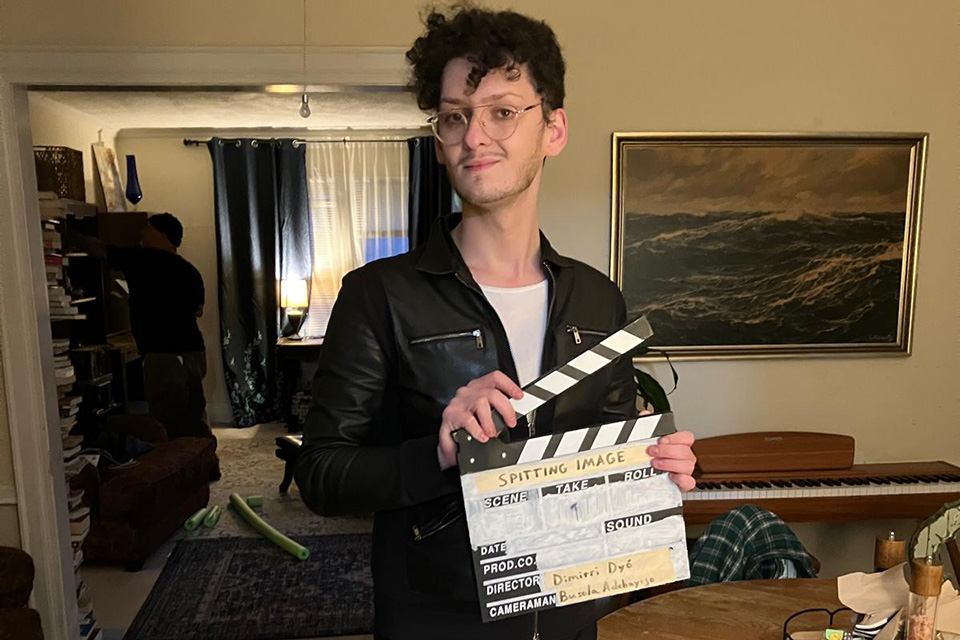
M.F.A. Creative Producing graduate Dimitri Dikhel.
While teaching, he took acting classes and worked on creative writing, which helped him improve his English. For Dikhel, acting was initially meant to be a healthy exercise in creativity, but his participation eventually led him to become a member of an acting group. Admittedly a shy person, going into the arts allowed him to start overcoming his fears and become more comfortable with his creative identity.
These experiences laid the foundation for Dikhel to further his education at UNCSA. Looking ahead, Dikhel enters the creative industry with professional experience, including with the Sundance Institute, a veteran entertainment legal firm, and as the director, writer and producer of several genre-diverse short films with aspirations to grow in animation.
What inspired you to pursue filmmaking?
Film basically taught me German when my family immigrated. When we moved, we had numerous plastic bags full of VHS cassettes, and in Eastern Europe, the films are dubbed by one man’s monotone depressing voice who narrates all the characters, but I can still hear the English underneath. It’s beautiful; in “Beauty and the Beast,” the same man does the voice for Belle and Beast and it is a very morose Russian man in both cases. With anime, I could hear a little bit of Japanese underneath and those phrases just stuck.
That’s something I love about cinema – there is something universal about it.
Dimitri Dikhel
What intrigued me about film is that you can follow the story without necessarily knowing what the characters are saying, and so I learned German before entering elementary school because I was watching cartoons and films at home. That’s something I love about cinema – there is something universal about it.
Why did you choose Creative Producing as your focus at UNCSA?
I originally got into creative producing because I didn’t know much about the legal or financial side of filmmaking. I wanted to learn how to find funding for an idea, make a case for a project and compete in the market. I love all the different sides of filmmaking from beginning to end and wanted a more comprehensive understanding of how it works. Now, I’m not only involved in several of my own projects but also other students' projects, including everything from movie posters to marketing to writing.
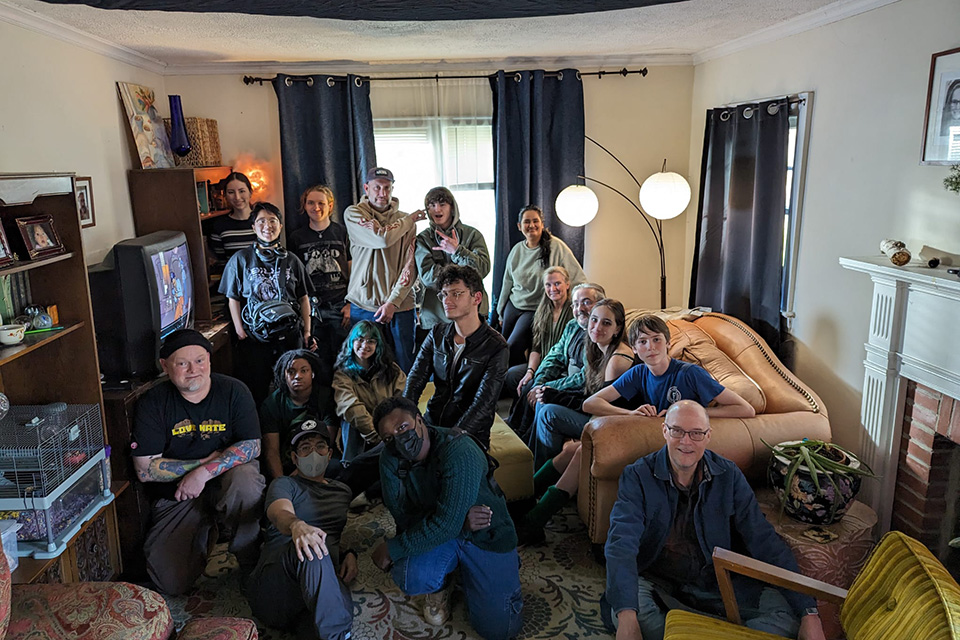
Dimitri Dikhel with the cast and crew of "Spitting Image"
How did your theater and film-related internships support you as an aspiring creative producer?
As an actor, one very important idea that stuck with me is that when it comes to writing or reading a script, somebody has to read it. An actor has to read this and say this; they need to be able to play around with it, put their own spin on it, or maybe even add to it. My time working with the Sundance Institute was invaluable because it humbled me. The caliber of scripts that get rejected there really pushed me to stay ambitious and to polish and re-polish projects I’m working on.
My previous experience with teaching taught me that when you have to boil something down simple enough for children, that helps you understand the concept yourself. It’s become a great tool to help with the pitching process. In retrospect, the parallels between my education, growing up trilingual, and translating for many family members emphasized that communication and conveying messages were always very important to me and ultimately supported me greatly during my time at UNCSA.
How have you collaborated with students from different disciplines at UNCSA?
While at UNCSA, I made organic connections within the School of Filmmaking and other conservatories that led to the projects I’ve worked on and continue to work on. There are fascinating students, faculty members, staff and people within the Winston-Salem community who are further along in their journey than me and I’m always fascinated to learn as much as I can from their expertise.
After the first year in the graduate filmmaking program, you get a certain reputation for what you write about and what your skill set is. So, I became very excited when a Filmmaking colleague, who knew I liked to experiment with form and could produce something a bit nuttier and out of the box, invited me to work on a dance film. The film, “Merde!,” became a project that I wrote, directed and co-edited for the School of Dance and one where I was able to experiment and film with a round aspect ratio.
I also collaborated with Erwick D’Souza, a Film Music Composition graduate student, on a short sci-fi script. We connected with students and faculty member Bob Keen from the Visual Effects and Immersive Media department and ultimately co-directed the short film “Earthlings” last year as a motion capture project. Directing actors with the suits and tennis balls is just as much of a sci-fi experience as the film itself and that was a fantastic process because we didn’t see eye-to-eye on everything and, as a result, we created some amazing art. It also taught me a lot as a creative producer because I had to state my case, make my argument and work through differences in creative choices.
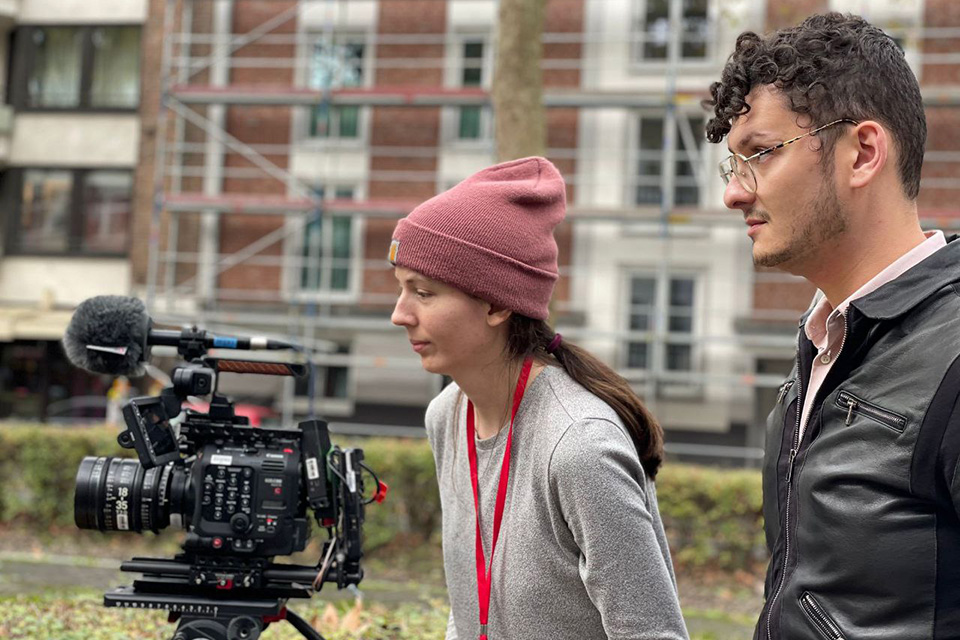
Dimitri Dikhel on a film set.
Ultimately, I am in awe of how many people just want to help if they’re genuinely interested in a project. It was a scary but rewarding experience. When I was on the set of "Spitting Image," seeing how dedicated everyone was, how everybody really cared about the project, dedicated their time to it, and worked without getting much other than an IMDB credit and some wages was very humbling. I cannot just refer to that project as my film; it was everyone's. I’ve found a very lovely community here.
What is a significant memory you have from your time at UNCSA?
The day I arrived from Germany, I unpacked my things and was getting ready to go to the improv class with Keith Harris when I got a call from home that my grandfather died. I was devastated and I missed him a lot. My family kept his passing from me until I was in America so I wouldn’t decide to miss the first week at UNCSA, which I understand.
That same first week, my birthday was coming up and I didn’t know anybody here. To my surprise, my girlfriend flew in and my new classmates and students from the international groups on campus showed up to surprise me. I was shocked at how many people showed up just for me. It was so unexpected and turned out to be such a happy memory that helped get me through such a tough time in my life. Some of the happiest moments were coming to UNCSA and finding out how open, supportive and kind my classmates for the next two years were going to be.
Reflecting on your experience, what advice would you give yourself?
Showing my work more was the big thing I would’ve told myself in the beginning. I came to UNCSA naturally introverted, naturally hiding my work and only presenting it when strictly necessary. What I learned is when meeting like-minded people it’s very important to share your work and share your ideas. So now, looking back, that was the big tip I would’ve told myself: to be a bit more extroverted, to show off, and that you’re not successful enough to be humble yet.
Get the best news, performance and alumni stories from UNCSA.
SUBSCRIBE TO OUR NEWSLETTERS(OPENS IN NEW TAB)(OPENS IN NEW TAB)(OPENS IN NEW TAB)(OPENS IN NEW TAB)(OPENS IN NEW TAB)(OPENS IN NEW TAB)(OPENS IN NEW TAB)(OPENS IN NEW TAB)(OPENS IN NEW TAB)(OPENS IN NEW TAB)(OPENS IN NEW TAB)(OPENS IN NEW TAB)(OPENS IN NEW TAB)(OPENS IN NEW TAB)(OPENS IN NEW TAB)(OPENS IN NEW TAB)(OPENS IN NEW TAB)(OPENS IN NEW TAB)(OPENS IN NEW TAB)(OPENS IN NEW TAB)(OPENS IN NEW TAB)(OPENS IN NEW TAB)(OPENS IN NEW TAB)(OPENS IN NEW TAB)
May 10, 2024
